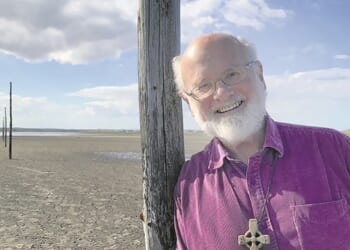From yesterday’s decision by Florida trial court judge Hunter Carroll in Trump Media & Tech. Group Corp. v. Guardian News & Media Ltd.:
This action arises from the publication of several articles reporting on a federal criminal investigation related to TMTG’s receipt of two payments totaling $8 million. On March 15 and March 17, 2023, the Guardian published two articles stating federal prosecutors in New York were conducting a money laundering investigation related to the payments, which were wired through the Caribbean from Paxum Bank and ES Family Trust, entities with ties to an ally of Russian president Vladimir Putin and a history of providing banking services to the sex worker industry. The articles report [TMTG co-founder Will] Wilkerson’s statements that the origins of the loans caused alarm at TMTG and TMTG’s then CFO weighed returning the money, but the money was ultimately not returned….
The Guardian articles were reported on by others. On March 15 and March 22, Penske published two articles in Variety that reported federal prosecutors investigated TMTG for potential money laundering violations related to the payments. On March 18, [Defendant Chris] Anderson published an article in the Sarasota Herald-Tribune that stated federal prosecutors were reportedly investigating the payments to TMTG. The Variety articles and the Herald-Tribune article explicitly reference and provide direct links to the Guardian articles as the source for the statements at issue.
TMTG alleges the articles published by the Defendants are false and defamatory because TMTG “is not, and never was, under investigation for money laundering,” and neither TMTG nor its executives have “been the focus of any investigation.” …
Count 1 purports to state a claim for defamation and defamation per se based on seven allegedly false statements published in the Guardian articles:
- “Federal investigators examined [TMTG] for possible money laundering”;
- “New York prosecutors expanded [a] criminal inquiry of [TMTG] last year and examined acceptance of $8m with suspected Russian ties”;
- “Federal prosecutors in New York involved in the criminal investigation into [TMTG] last year started examining whether it violated money laundering statutes in connection with the acceptance of $8m with suspected Russian ties”;
- “[TMTG] initially came under criminal investigation over its preparations for a potential merger with a blank check company called Digital World (DWAC)”;
- That there was a “criminal investigation” of TMTG and that the nature of the investigation “expanded”;
- That “prosecutors in the US attorney’s office for the southern district of New York” were “examin[ing]” the “Russian connection”; and
- That “months after [TMTG] came under criminal investigation for the merger by the US attorney’s office for the southern district of New York, federal prosecutors started to examine whether the company violated money-laundering statutes over the payments.”
Count 2 purports to state a claim for defamation by implication based on two statements published in the Guardian articles:
- “The extent of the exposure for Trump Media and its officers for money laundering remains unclear. The statutes broadly require prosecutors to show that defendants knew the money was the proceeds of some form of unlawful activity and the transaction was designed to conceal its source. But money laundering prosecutions … can be based on materials that show that the money in question was unlikely to have legitimate origins”; and
- “A spokesman for the justice department, the US attorney’s office for the southern district of New York and outside counsel for Trump Media declined to comment about the investigation.”
The court held that the defendants’ substantial truth defense couldn’t be accepted in this case on a motion to dismiss:
The Guardian and Wilkerson first argue the challenged statements are substantially true.
The substantial truth doctrine provides that even if the challenged statement contains minor inaccuracies, it is not actionable if the “gist” or “sting” of the statement is true when read in the full context of its publication. The ultimate question is whether the alleged inaccuracies change the statement’s effect on the mind of the reader. Where a statement is ambiguous and reasonably susceptible of a defamatory meaning, the question must be submitted to the trier of fact.
The Guardian and Wilkerson argue the gist of the articles is that the loans to TMTG from Russian sources caused concern among TMTG executives and prompted an investigation by federal prosecutors. They argue that any inaccuracies in the challenged statements do not materially change their sting within the context of the articles. TMTG responds that the false and defamatory gist of the articles is that prosecutors were investigating TMTG specifically or focusing on TMTG for wrongdoing. The Court finds the challenged statements are susceptible of both interpretations and cannot be resolved on a motion to dismiss.
But the court concluded that the plaintiffs’ hadn’t plausibly alleged enough evidence supporting the constitutionally required finding of “actual malice,” which is to say that any possible falsehood was knowing or reckless:
The actual malice element of both claims rests on the following allegations:
- The Guardian harbors bias against TMTG and frequently publishes articles critical of Donald Trump.
- The Guardian relied on Wilkerson as its sole source for the statements despite knowing Wilkerson had “bad blood with TMTG” because he was fired from TMTG for making unauthorized disclosures.
- The Guardian failed to investigate and obtain independent evidence for the statements in violation of journalistic standards.
- Devin Nunes, then CEO of TMTG, notified the Guardian the statements were false.
- Wilkerson “knew that TMTG did not commit any wrongdoing” because he was aware of TMTG’s finances from his former role.
- Wilkerson “was in a position to know” the statements were false based on his discussions with federal investigators.
TMTG’s allegations of Guardian and Wilkerson’s bias or ill will, without more, does not show actual malice.
TMTG’s allegations that Wilkerson was the sole source for the challenged statements is belied by the face of the article. The article attributes its description of the investigation to the plural “sources familiar with the matter.” The only statements attributed to Wilkerson are: (1) that DWAC CEO Patrick Orlando declined to provide details about the lenders or the origins of the loan; and (2) that concerns about the origins of the loans prompted TMTG’s then CFO to consider returning the money. TMTG does not allege these statements are defamatory. TMTG concedes Wilkerson had knowledge of relevant TMTG financial information and was in discussions with the federal investigators referenced in the articles. Whether Wilkerson knew TMTG had actually committed any wrongdoing is not germane to the existence or nature of the investigation.
Actual malice also requires more than a departure from journalistic standards or a mere failure to investigate. Moreover, the article reflects it was based on multiple sources familiar with the investigation, review of internal TMTG communications, investigation of the entities who made the loans, and fruitless requests for further information from the Department of Justice, the investigators’ office, and outside counsel for TMTG.
The article also reported the denial of then CEO Nunes that TMTG knew of any issues related to the loans. This denial is not germane to the existence or nature of the investigation, and even if it was, such commonplace denials do not establish actual malice.
Finally, TMTG’s allegations that further investigation would have proved the statements false or that Wilkerson was “in a position to know” the statements were false are conclusory and unsupported by factual allegations….
The court also ruled in favor of two other defendants, who relied on The Guardian‘s reporting: As to Penske Media, which owns Variety, the court applied the wire service privilege, which, despite its name, “protects a defendant who republishes the reporting of a reputable news agency” (wire service or not); Penske is protected by the privilege, the court ruled, because it was entitled to rely on The Guardian‘s work. And the court concluded that statements in an article by Sarasota Herald-Tribune writer Chris Anderson were opinion:
The Anderson article was published in the opinion section of the Herald-Tribune with a disclaimer that it expressed the views of its author, and the headline identified the article as an opinion piece. When viewed on the Herald-Tribune website, the article also includes the following phrase: “Is Trump’s Sarasota company tied to Russia? Investigators want to know.” The article begins by stating federal prosecutors “have reportedly been investigating two loans” made to TMTG, a statement that is explicitly attributed to the March 15 Guardian article. The Anderson article states “[t]he Guardian reported this week” that the prosecutors “were examining loans” made to TMTG. The article opines that “even if the latest allegations are unfounded, the optics of being investigated for money laundering will not enhance his 2024 presidential run.”
The Anderson article, when read in its entirety, is protected opinion and not actionable. It is consistently identified as opinion article. It explicitly sets forth the “reported” facts on which the opinions are based, and it acknowledges that the “allegations” reported by the Guardian may be “unfounded.” Anderson states that prosecutors were “reportedly” investigating “the loans” made to TMTG, a statement TMTG does not dispute. The sole reference to TMTG being “under investigation” is Anderson’s opinion on how the “optics” of the facts reported by the Guardian may affect then-candidate Trump’s presidential campaign, with cautionary language that the allegations may be unfounded. When placed in context, these statements do not endorse the Guardian’s reporting but merely offer opinion and commentary on the possible effects of that reporting, with the caveat that it may be unfounded….
















